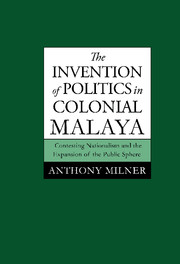 The Invention of Politics in Colonial Malaya
The Invention of Politics in Colonial Malaya Book contents
- Frontmatter
- Contents
- Preface
- Map of Malaya
- Introduction: Colonialism, Nationalism and Contest
- 1 The Ancien Régime: Described and Condemned
- 2 Establishing a Liberal Critique
- 3 A Description of the Real World: Expanding Vocabularies
- 4 Conceptualizing a Bangsa Community: A Newspaper of Moderate Opinions
- 5 Building a Bourgeois Public Sphere
- 6 Ideological Challenge on a Second Front: The Kerajaan in Contest with Islam
- 7 Answering Liberalism: Islamic First Moves
- 8 Kerajaan Self-reform: Chronicling a New Sultanate
- 9 Practising Politics in the Mid-Colonial Period
- 10 Surveying the Homeland: Sedar and Dialogic Processes
- Conclusion: The Malay Political Heritage
- Select Bibliography
- Index
10 - Surveying the Homeland: Sedar and Dialogic Processes
Published online by Cambridge University Press: 18 December 2009
- Frontmatter
- Contents
- Preface
- Map of Malaya
- Introduction: Colonialism, Nationalism and Contest
- 1 The Ancien Régime: Described and Condemned
- 2 Establishing a Liberal Critique
- 3 A Description of the Real World: Expanding Vocabularies
- 4 Conceptualizing a Bangsa Community: A Newspaper of Moderate Opinions
- 5 Building a Bourgeois Public Sphere
- 6 Ideological Challenge on a Second Front: The Kerajaan in Contest with Islam
- 7 Answering Liberalism: Islamic First Moves
- 8 Kerajaan Self-reform: Chronicling a New Sultanate
- 9 Practising Politics in the Mid-Colonial Period
- 10 Surveying the Homeland: Sedar and Dialogic Processes
- Conclusion: The Malay Political Heritage
- Select Bibliography
- Index
Summary
On first impression our final text, Melihat Tanah Ayer or Surveying the Homeland, seems to view the world much as we do. It provides an analysis of the Malay community of British Malaya at the end of our period, on the eve of the Japanese Occupation. It possesses a language, style and perspective congenial to many present-day readers. This perspective – nationalist, left-wing, and highly political – promises a familiar vantage point, permitting us to discern the essential realities of colonial Malaya. In short, the text, on initial encounter, offers the opportunity of an appropriate closure to this study.
Despite this first reaction, however, on closer inspection the ideological imperatives of the text are less straightforward. Surveying the Homeland, like so many of the earlier texts, is constructed dialogically. Although participating in, and even promoting, the new political sphere, its ideological messages are only partly a product of Western influence. They emerge also from a perceived need to satisfy longstanding Malay preoccupations, one of which concerned the relation between the individual and society. To some extent this apparently unambiguous, liberal-socialist, document arises from a process of ideological concatenation reaching back to the confrontation between the kerajaan and Munshi Abdullah.
The author of Surveying the Homeland, Ibrahim Yaacob, declares his particular perspective in the opening paragraphs of the ‘introduction’. He describes the ninety-six page book as “a gift” to the Malays and declares his intention to “carry out a service to my bangsa”. He seeks, he says, a “strategy” (muslihat) for the advance of his people.
- Type
- Chapter
- Information
- The Invention of Politics in Colonial MalayaContesting Nationalism and the Expansion of the Public Sphere, pp. 257 - 281Publisher: Cambridge University PressPrint publication year: 1995


